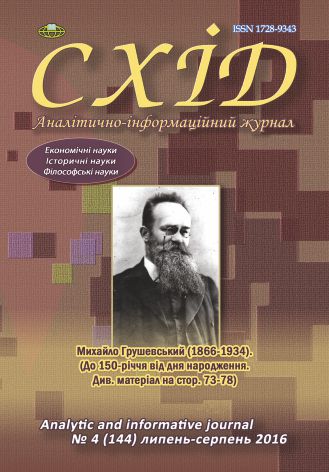Personalism in orthodox theology
DOI:
https://doi.org/10.21847/1728-9343.2016.4(144).78102Keywords:
religious philosophy, personality, hypostatis, person, theology, orthodoxy, personalism, patrology.Abstract
The paper looks into the personalistic doctrine of the orthodox theological tradition. It covers the prerequisites of development of Christian understanding of personhood in Judaism and Greek philosophy and analyzes the origin of the personalistic theory in the theological tradition of eastern patristics. The role of personalism in triadological and Christological concepts of the epoch of Oecumenical Councils is defined. The specifics of understanding of personhood in contemporary orthodox theological thought is explored.
The author comes to conclusion that personalism of traditional orthodox theology is to large extent metaphysical because its content was created as a result of synthesis of evangelic world outlook and platonism whereas its language was borrowed from Aristotle's 'Categories".
Personalism of contemporary orthodox thought adds existentialism to Christian world outlook in the 20th century. The above is confirmed through reviewing such works as P. Florensky's 'The Pillar and Ground of the Truth', V. Losky's 'The Mystical Theology of the Eastern Church' and John Zizioulas's 'Being and Communion. Studies in personhood and the Church' as well as 'Communion and otherness. Further studies in personhood and the Church'.
In the 21st century personalism in Orthodoxy is enriched with personalistic phenomenology of emotional experience. The above is demonstrated by such conceptual works as C. Yannaras's 'Postmodern Metaphysics' and J. Manoussakis's 'God after Metaphysics'.
In the opinion of the paper's author, recourse of contemporary orthodox theological thought to philosophy in handling Christian personalism is necessary not only for the purposes of apologetics but also for implementation of personalism as a system.Downloads
References
1. Zizioulas, J. (1993), Being and Communion. Studies in personhood and the Church, St. Vladimir’s Seminary Press, N.Y., 280 p. (eng).
2. Zizioulas, J. (2006), Communion and otherness. Further studies in personhood and the Church, T & T Clark, N.Y., 315 p. (eng).
3. Casiday, A. and Theokritoff, E. (2008), Church Fathers and the shaping of Orthodox theology, Cambridge University Press, Cambridge, 167-187. doi: 10.1017/ccol9780521864848.012
4. Melissaris, A. D. (1999), The challenge of patristic ontology in the theology of metropolitan John (Zizioulas) of Pergamon, The Greek Orthodox theological review, № 44 / 1-4, 467-490 (eng).
5. Hankey, W. J. (1999), Theoria versus Poesis: Neoplatonism and Trinitarian Difference in Aquinas, John Milbank, Jean-Luc Marion and John Zizioulas, Modern Theology, 15:4 (October), 387-415. doi: 10.1111/1468-0025.00105
6. Williams, R. (1997), Eastern Orthodox Theology, in: The modern theologians. In introduction to Christian Theology in the twentieth century, University of Cambridge, 499-513 (eng).
7. Louth, A. and Theokritoff, E. (2008), The patristic revival and its protagonists, in: The cambridge companion to orthodox christian theology, University Press, Cambridge, 188-202. doi: 10.1017/ccol9780521864848.013
8. Papanikolaou, A. and Theokritoff, E. (2008), Personhood and its exponents in twentieth-century Orthodox theology / Aristotle Papanikolaou, in: The Cambridge companion to orthodox Christian theology, Cambridge University Press, 232-245. doi: 10.1017/ccol9780521864848.016
9. Meyendorff, J. (1974), Byzantine Theology: Historical Trends and Doctrinal Themes, Fordham University Press, N. Y., 243 p. (eng).
10. Christou, P. (1982), Maximos Confessor on the infinity of man, in: Maximus Confessor. Actes du Symposium sur Maxime le Confesseur Fribourg, 2-5 septembre 1980, Fribourg, 261-271 (eng).
11. Larchet, J.-C. (1996), La divinisation de l’homme selon saint Maxime le Confesseur, Ed. du Cerf, Paris, 765 p. (french).
12. Florensky, Pavel (2012), Pillar and Ground of the Truth. Experience Orthodox theodicy in twelve letters, Academic Project, Moscow, 912 p. (rus).
13. Bulgakov, S., prot. (..), Chapters on Trinity, Journal «Orthodox thought», №1, available at: http://www.odinblago.ru/pm_1/2 (rus).
14. Lossky, V.N. (1991), Sketch mystical theology of the Eastern Church. Dogmatic theology, SEI Center, Moscow, 288 p. (rus).
15.Yannaras, Christos (2004), Postmodern metaphysics, Holy Cross Orthodox Press, Brookline, 200 p. (eng).
Manoussakis, John Panteleimon (2007), God after Metaphysics. A Theological Aesthetic, Indiana University Press, Bloomington, 213 p. (eng).
Downloads
Published
How to Cite
Issue
Section
License
Copyright (c) 2016 Gennadii Khrystokin

This work is licensed under a Creative Commons Attribution-NonCommercial-NoDerivatives 4.0 International License.
1. Authors bear responsibility for the accuracy of facts, quotations, numbers and names used.
2. Manuscripts are not sent back.
3. The publisher does not always agree with the authors' opinion.
4. The authors reserve the right to authorship of the work and pass the first publication right of this work to the journal under the terms of a Creative Commons Attribution-NonCommercial-NoDerivatives 4.0 International License. This license allows others to distribute (copy) the published work for non-commercial purposes, provided there is mandatory attribution to its authors and a link to the first publication in our journal.
5. The authors have the right to conclude separate supplement agreements that relate to non-exclusive work distribution in the form in which it has been published by the journal (for example, to upload the work to the online storage of the journal or publish it as part of a monograph), provided that the reference to the first publication of the work in this journal is included.

